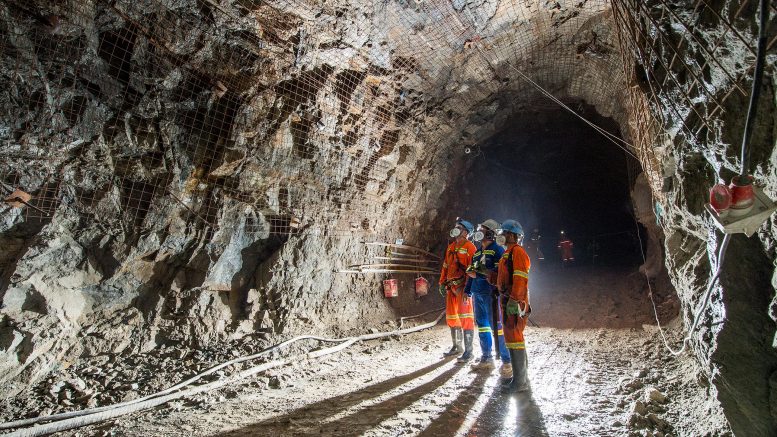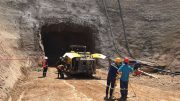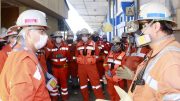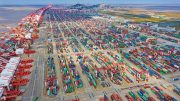One of the key themes that emerged from the 30th BMO Global Metals & Mining conference last week was the desire among many gold and base metal companies to increase their exposure to copper. The investment bank’s fireside chats with CEOs and presentations were not open to the media, but according to highlights BMO released each day, the outlook for copper and its importance to the green energy transition dominated much of the discussion. When BMO polled participants on the final day, more than 70% said copper “will see the strongest demand growth” (and well ahead of nickel), between 2021 and 2025.
“The bullish outlook for copper,” BMO analyst Jackie Przybylowski summarized in one of many reports from the conference, “could lead to organic growth (including project sanction of new copper developments by First Quantum, Newmont, Teck, Yamana) or M&A (including Barrick, Lundin Mining),” while “a renewed push to growth could raise the value for copper assets (or asset stakes) available for sale …”
Among the CEOs who talked about their copper options were Nexa Resources’ Tito Martins, who said the company will raise its copper exposure through its Magistral project in Peru, and Ero Copper CEO David Strang, who said there was potential to double production of the metal by expanding and optimizing its MCSA mining complex in Brazil, and through the advancement of its Boa Esperanca project. Yamana CEO Daniel Racine pointed out that the company has copper exposure via its 56.25% stake in the MARA joint-venture in Argentina with Glencore and Newmont, and according to Przybylowski’s summary, “the company is considering options to fund and develop this asset, which might include spinning out the asset to its shareholders as a separate ‘Yamana Copper’ vehicle…” Takeaways from Barrick CEO Mark Bristow, she said, were that the gold major “is open to both gold and copper assets, because the two metals naturally occur together, because copper, which is already a key contributor to Barrick’s earnings, further diversifies the company’s portfolio, and because copper is expected to benefit with a green economy.”
Hudbay Minerals CEO Peter Kukielski noted that copper’s role in renewable energy will benefit from U.S. policy under President Joe Biden’s administration and this could be a positive for its troubled Rosemont project; Lundin Mining CEO Marie Inkster said copper made up two-thirds of the company’s commodity mix and it would “likely prioritize growth in this commodity,”; and Newmont CEO Tom Palmer said its pipeline held Galore Creek, NuevaUnion and the Yanacocha Sulfides, “which will naturally raise the company’s copper exposure over time, including some copper growth potentially as early as the end of this decade,” Przybylowski wrote.
BMO analyst Raj Ray noted that AngloGold Ashanti and Sibanye-Stillwater said they want to boost their copper exposure. “AngloGold’s Quebradona copper-gold project in Colombia (investment decision expected in H1/2021) will be the company’s first material-copper exposure but when asked, interim CEO, Christine Ramon, indicated AngloGold was not opposed to increasing its exposure to copper further in the future,” he summarized, while Sibanye-Stillwater “has highlighted copper as one of the target metals as it looks to build a battery metals portfolio.”
It’s no surprise, really. The metal will be critical in the green energy transition, and has roughly doubled in price from its lows a year ago, touching an intra-day high of US$4.37 per lb. in the final days of February, not far from its all-time record of US$4.58 per lb. in February 2011. Inventories on the London Metal Exchange are down roughly 32% in the year to date. The tightening supply, Haywood Securities’ Pierre Vaillancourt recently noted, “is beginning to affect China’s scrap metal markets as traders hoard supplies in anticipation that new clean energy policies and increased electrification will remove additional stocks from global inventories.”
What happens to the price over the next year remains anyone’s guess, however. In a Feb. 25 research note entitled Copper: Augmented Reality, BMO’s Colin Hamilton said he “could easily see a new all-time high for copper prices over the coming weeks,” and acknowledged “there is little doubt that the copper market is tight at the moment. … But in our view the question now comes down to sustainability of the price gains.”
The analyst predicted copper prices will see their peak in the current quarter, and will likely revert to around US$3 per lb. late in the second half of the year. He pointed to the copper price peak in 2011 as an example of “buyers essentially scared off by the price gains.”
“In the months after that peak, Chinese demand dropped quickly into negative y/y growth before stabilizing. Interestingly, China’s State Grid, the world’s largest copper consumer, has urged wire and cable fabricators to accept orders at January price levels, and pulled back from purchasing amid the recent price rally. Moreover, the latest SMM survey pointed to a number of companies sitting on the sidelines in terms of placing new orders, awaiting a market correction.” Hamilton predicts that even with global demand growth this year of over 4%, and factoring in disruption to supply, “we end up with a roughly balanced market, with a surplus building in 2022 as more supply enters the market.”






Be the first to comment on "Is copper the new gold?"